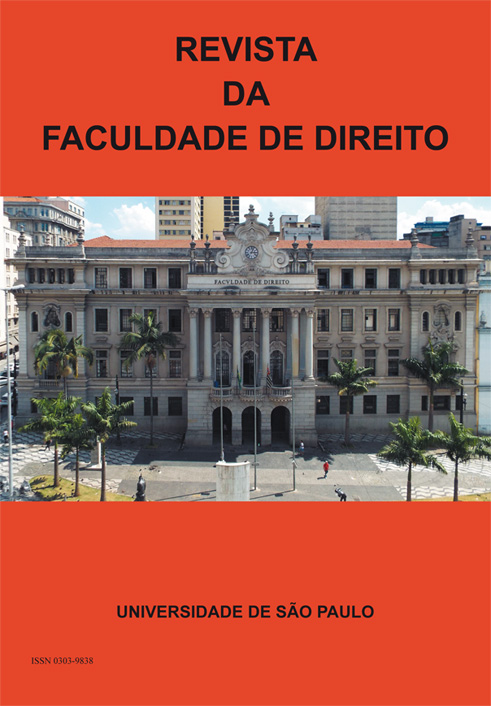Judaism: ancient and modern. Majority observance to the Talmudic law. Human rights
DOI:
https://doi.org/10.11606/issn.2318-8235.v114p69-100Keywords:
Concise summary of ancient and modern Judaism., Talmudic Law., Roman, Eastern, Sephardic and Ashkenazic diasporas., Human Rights., Modern Israel.Abstract
In the main premise, Judaism does not only involve rituals, religious or ceremonial knowledge. The function is one of extreme understanding in the conduct of a life system in any circumstance and situation of life for its followers. Its doctrine implies studies of the Thorah, the Book of Jewish Laws, which establishes in detail the correct actions to be carried out, emphasizing the belief that the Faith is conquered through these actions, extracted from the very will found in the heart of the Spirit of each one. individual. The whole of Judaism is described in the Holy Scriptures; Books that make up the Holy Bible in the “Old Testament”, divided into three parts, namely: the Law (Thorah), the Prophets (Nebi’im) and the Sapiential Writings or Hagiographers (Ketubin). It should be noted that Thorah has the original meaning of divine instruction transmitted to a prophet or priest chosen, individually, by the Creator-of-All-Things, becoming an unbeatable heritage of the Jewish People: true guide of life; however, consistent teachings of precepts, the word Thorah is invariably translated as Law. Finally, Thorah has the denomination of Pentateuch, composed of five Books, namely: Genesis, Exodus, Leviticus, Numbers and Deuteronomy and the first periods are recorded in it. of Israel’s history, from Moses’ liberation of the Israelites from slavery in Egypt. The Thorah, according to the rabbis, has 613 precepts, 248 commandments and 365 prohibitions, the content of which would have been written by Moses until 1225 BC Some nations were born to shine - the case of Israel -, since it is not just any story, including the legacy left to Humanity, through Judaism - ancient and modern -, perpetuated by a People, chosen by the One God - the Israelites -, who must forever be narrated and passed on to the future men of this small and incredible planet ... our House ! Final premise: Talmud means teachings; it is a literary compilation, written in Hebrew and Aramaic which, in turn, gathers debates and discussions of the ancient rabbis about a wide range of religious and social issues, existing in two versions: Babylonian Talmud and Palestinian Talmud, whose observance is governed in current times of the Israeli legal system and a cornerstone of rabbinic Judaism, like Human Rights, very advanced in modern Israel.
Downloads
References
ARMSTRONG, Karen. Em nome de Deus: o fundamentalismo no judaísmo, cristianismo e islamismo. Tradução Hildegard Feist. São Paulo: Companhia das Letras, 1998.
BARYLKO, Jaime. La filosofia de Maimónides. Buenos Aires: Marymar, 1985.
BLANC, Claudio. Um sistema de vida. In: BLANC, Claudio. História das religiões especial. São Paulo, Online, 2015. p. 64-73.
BRENNAN, Robert John; CORRÊA, David R. D. Profecias messiânicas. São Paulo: [s. n.], 1989.
CAHILL, Thomas. A dádiva dos judeus. Tradução de Ana Luiza Borges de Barros. São Paulo: Objetova, 1999.
CAMPOS NETO, Antonio Augusto Machado de. O judaísmo. O direito talmúdico. Revista da Faculdade de Direito da Universidade de São Paulo, São Paulo, v. 103, p. 27-67, jan./dez. 2008.
COHEN, Boaz. Law and tradition in Judaism. New York: Jewish Theological Seminary of America, 1966.
DE LANGE, Nicholas Robert Michael. Povo judeu: odisseia através dos séculos. Tradução de Carlos Nougué, Francisco Magalhães, Maria Júlia Braga e Joana Bergman. Barcelona: Folio, 2007.
FALK, Ze’ev W. O direito talmúdico. São Paulo: Perspectiva, 1988.
GUIMARÃES, Sabbá Isaac. O direito talmúdico como precursor de direitos humanos. Revista Jus Navigandi, Teresina, ano 10, n. 856, nov. 2005. Disponível em: https://jus.com.br/artigos/7470/o-direito-talmudico-como-precursor-de-direitos-humanos.
JOHNSON, Paul. História dos judeus. Tradução de Carlos Alberto Pavanelli. Rio de Janeiro: Imago, 1989.
KAMEL, Ali. Sobre o Islã: a afinidade entre muçulmanos, judeus e cristãos e as origens do terrorismo. Rio de Janeiro: Nova Fronteira, 2007.
MACHADO, Antonio Claudio da Costa. O casamento no pentateuco. Revista da Faculdade de Direito da Universidade de São Paulo, São Paulo, v. 84/85, p. 27-34, jan./dez. 1989/1990.
MAIMÔNIDES, Moses. Comentários da Mishná: ética dos pais Sanhedrin. Tradução de Alice Frank. São Paulo: Maayanot, 1993.
MAIMÔNIDES, Moses. Mishné Torá: o livro da sabedoria. Tradução Yaacov Israel Blumenfeld. Rio de Janeiro: Imago, 1992.
______. Os 613 mandamentos. Tradução de Giuseppe Nahaïssi. São Paulo: Nova Stella, 1999.
MAROTTA RANGEL, Vicente. Direitos humanos, judaísmo e ordem internacional. Revista da Faculdade de Direito da Universidade de São Paulo, São Paulo, v. 78, p. 234-240, jan./dez. 1983.
SACCO, Joe. Palestina: uma nação ocupada. Tradução de Cris Siqueira. São Paulo: Conrad, 2001.
WILKINSON, Philip. O livro ilustrado das religiões: o fascinante universo das crenças e doutrinas que acompanham o homem através dos tempos. São Paulo: Publifolha, 2002.
Downloads
Published
Issue
Section
License
Copyright (c) 2019 Revista da Faculdade de Direito, Universidade de São Paulo

This work is licensed under a Creative Commons Attribution-NonCommercial-ShareAlike 4.0 International License.


